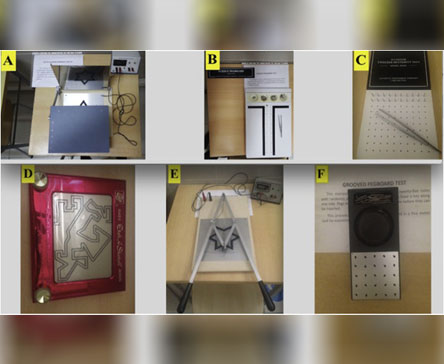Engin Çetinkaya, Hakan Çift, Ahmet Aybar, Ersin Erçin, Gamze Babür Güler, Oguz Poyanlı
Baltalimani Bone and Joint Diseases Education and Research Hospital, Istanbul, Turkey
Central Hospital, Istanbul, Turkey
Istanbul GOP Taksim EAH, Department of Orthopaedics and Traumatology, Istanbul, Turkey
Bakirkoy Dr. Sadi Konuk EAH, Department of Orthopaedics and Traumatology, Istanbul, Turkey
Istanbul Medipol University, Department of Cardiology, Istanbul, Turkey
Istanbul Medeniyet University, Department of Orthopaedics and Traumatology, Istanbul, Turkey
Abstract
Objectives
The aim of this prospective study is to evaluate the impact of the simulation training program in learning duration of arthroscopic motor skills. Furthermore, we investigated the difference between junior and experienced residents in the improvement of arthroscopic motor skills duration.
Methods
We established 2 study groups according to participants’ year of experience in orthopedic residency with junior group residents with three years or less than three years experience as group 1 and experienced group with over 3 years of experience as group 2. We calculated duration change of motor skill test results for each participant before and after the course. The tools used were; auto scoring mirror tracer(ASMT), 0’Conner the tweezer dexterity test(OCTDT), etch-a-sketch with overlay(ESOT), purdue the pegboard test(PPT), two-arm coordination test(TACT) and grooved pegboard test(GPT) which were all produced by Lafayette firm. These instruments were used to practice and measure the basic motor skills.
Results
All post–course test durations for participants decreased significantly when compared to pre-course. We calculated percentage change of motor skill test results for each participant before and after the course. All motor skill test percentage changes were similar between two groups. In comparison of participants according to their experiences, results revealed that there was no difference in test results of experienced and junior surgeons. Both groups had provided equal improvement in terms of motor skills.
Conlusion
As our results revealed, residents will be able to act with a strong motivation to learn applications through basic arthroscopic information gained in early period of orthopedic training and will make more successful applications of real patients.
Introduction
Arthroscopic surgery is one of the most frequent surgical methods employed by orthopedic surgeons throughout the world. Special training in addition to classical surgical training is required to acquire arthroscopic skills. Due to changing circumstances imposed on training environments by liability regulations, limited working hours and increased patient awareness has forced surgeons to search better and more effective training methods.
As in other surgical disciplines, arthroscopic skills have the tendency to improve through experience, but due to aforementioned reasons, training of the surgeons should reach a certain level before they are allowed for hands-on training to reduce the risks that may occur during operations in the initial stage of training.
There are several studies stating the improvements with arthroscopic motor skill courses. In our knowledge, there is no study that shows the objective results in improving duration period.
The aim of this prospective study is to evaluate the impact of the simulation training program on learning duration of arthroscopic motor skills. Furthermore, we investigated time improvement of arthroscopic motor skills of junior and senior residents.

